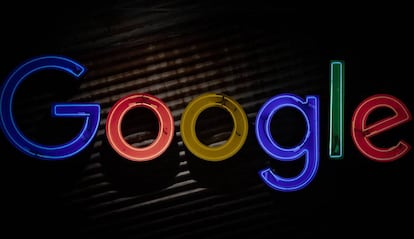EU regulators: Google must break up digital ad business over competition concerns
The European Union has led the global movement to crack down on Big Tech companies but rather than splitting up businesses it has previously issued blockbuster fines

European Union antitrust regulators took aim at Google’s lucrative digital advertising business in an unprecedented decision, saying Wednesday that the tech giant must sell off some of its ad business to address competition concerns.
The European Commission, the bloc’s executive branch and top antitrust enforcer, said its preliminary view after an investigation is that “only the mandatory divestment by Google of part of its services” would satisfy the concerns.
The 27-nation EU has led the global movement to crack down on Big Tech companies — including groundbreaking rules on artificial intelligence — but it has previously relied on issuing blockbuster fines, including three antitrust penalties for Google worth billions of euros (dollars).
It’s the first time the bloc has told a tech giant that it must split up key parts of its business over violations of the EU’s strict antitrust laws, though details on what that would look like have not been released.
Google can now defend itself by making its case before the commission issues its final decision. The company said it disagreed with the finding and “will respond accordingly,” with the EU’s investigation focusing on a narrow part of its ad business.
“Our advertising technology tools help websites and apps fund their content, and enable businesses of all sizes to effectively reach new customers,” said Dan Taylor, Google vice president of global ads. “Google remains committed to creating value for our publisher and advertiser partners in this highly competitive sector.”
The commission’s decision stems from a formal investigation that it opened in June 2021, looking into whether Google violated the bloc’s competition rules by favoring its own online display advertising technology services at the expense of rival publishers, advertisers and advertising technology services.
European Commission Vice President Margrethe Vestager says Google is dominant on both sides of the ad-selling market. Google abused that position by favoring its own ad exchange, reinforcing its ability to charge a high fee for its services, the commission said.
“Google is representing the interests of both buyers and sellers. And at the same time, Google is setting the rules on how demand and supply should meet,” she said at a news conference.” This gives rise to inherent and pervasive conflicts of interest.”
YouTube was one focus of the commission’s investigation, which looked into whether Google was using the video sharing site’s dominant position to favor its own ad-buying services by imposing restrictions on rivals.
Google’s ad tech business is also under investigation by Britain’s antitrust watchdog and faces litigation in the U.S.
Brussels has previously hit Google with more than €8 billion (now $8.6 billion) worth of fines in three separate antitrust cases, involving its Android mobile operating system and shopping and search advertising services.
The company is appealing all three penalties. An EU court last year slightly reduced the Android penalty to €4,125 million. EU regulators have the power to impose penalties worth up to 10% of a company’s annual revenue.
Sign up for our weekly newsletter to get more English-language news coverage from EL PAÍS USA Edition
Tu suscripción se está usando en otro dispositivo
¿Quieres añadir otro usuario a tu suscripción?
Si continúas leyendo en este dispositivo, no se podrá leer en el otro.
FlechaTu suscripción se está usando en otro dispositivo y solo puedes acceder a EL PAÍS desde un dispositivo a la vez.
Si quieres compartir tu cuenta, cambia tu suscripción a la modalidad Premium, así podrás añadir otro usuario. Cada uno accederá con su propia cuenta de email, lo que os permitirá personalizar vuestra experiencia en EL PAÍS.
¿Tienes una suscripción de empresa? Accede aquí para contratar más cuentas.
En el caso de no saber quién está usando tu cuenta, te recomendamos cambiar tu contraseña aquí.
Si decides continuar compartiendo tu cuenta, este mensaje se mostrará en tu dispositivo y en el de la otra persona que está usando tu cuenta de forma indefinida, afectando a tu experiencia de lectura. Puedes consultar aquí los términos y condiciones de la suscripción digital.








































